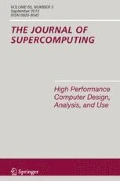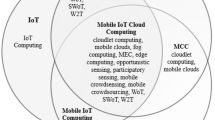Abstract
As a new type of computing, cloud computing has led to a major computational change. Among many technologies in cloud computing, task scheduling has always been studied as a core issue by industry and academia. In the existing research, the main goal is completion time or load balancing. However, as the expansion of cluster size, energy consumption becomes a problem that must be faced. In this paper, the first of maximum loss scheduling algorithm is proposed. The algorithm is a low-power algorithm that can greatly reduce the energy consumption of cloud computing clusters through loss comparison rule. The effect of this method is more obvious as the cluster size and the number of tasks increase. Experimental simulation results show that the proposed method is significantly better than the Max–Min, Min–Min, Sufferage and E-HEFT algorithms. Compared to Min–Min, Max–Min, Sufferage and E-HEFT algorithms, average completion time of the algorithm reduces 16%, 12%, 8% and 14%, respectively. At the same time, the load balancing effect is also better than Min–Min and Sufferage algorithms.









Similar content being viewed by others
References
Lago DGD, Madeira ERM, Bittencourt LF (2011) Power-aware virtual machine scheduling on clouds using active cooling control and DVFS. In: Proceedings of the 9th International Workshop on Middleware for Grids, Clouds and e-Science, Lisbon, Portugal
Ibarra OH, Kim CE (1977) Heuristic algorithms for scheduling independent tasks on nonidentical processors. J ACM 24:280–289
Armstrong R, Hensgen D, Kidd T (1998) The relative performance of various mapping algorithms is independent of sizable variances in run-time predictions. In: Heterogeneous Computing Workshop, 1998. (HCW 98) Proceedings. 1998 Seventh, 1998, pp 79–87
Dean J, Ghemawat S (2008) MapReduce: simplified data processing on large clusters. Commun ACM 51:107–113
Lämmel R (2008) Google’s MapReduce programming model: revisited. Sci Comput Program 70:1–30
Tumanov A, Cipar J, Ganger GR, Kozuch MA (2012) Alsched: algebraic scheduling of mixed workloads in heterogeneous clouds. In: Proceedings of the Third ACM Symposium on Cloud Computing, San Jose, California
Ragmani A, Omri AE, Abghour N, Moussaid K, Rida M (2016) An improved scheduling strategy in cloud computing using fuzzy logic In: Proceedings of the International Conference on Big Data and Advanced Wireless Technologies, Blagoevgrad, Bulgaria
Zhan Z-H, Liu X-F, Gong Y-J, Zhang J, Chung HS-H, Li Y (2015) Cloud computing resource scheduling and a survey of its evolutionary approaches. ACM Comput Surv 47:1–33
Li X, Lo J-C (2012) Pricing and peak aware scheduling algorithm for cloud computing. In: Proceedings of the 2012 IEEE PES Innovative Smart Grid Technologies
Karthick AV, Ramaraj E, Subramanian RG (2014) An efficient multi queue job scheduling for cloud computing. In: 2014 World congress on Computing and Communication Technologies, pp 164–166
Man ND, Huh EN (2013) Cost and efficiency-based scheduling on a general framework combining between cloud computing and local thick clients. In: 2013 International Conference on Computing, Management and Telecommunications (ComManTel), pp 258–263
Huang CC, Huang CL (2012) Development of cloud computing based scheduling system using optimized layout method for manufacturing quality. In: 2012 International Symposium on Computer, Consumer and Control, pp 444–447
Hwang I, Kam T, Pedram M (2012) A study of the effectiveness of CPU consolidation in a virtualized multi-core server system. In: Proceedings of the 2012 ACM/IEEE International Symposium on Low Power Electronics and Design, Redondo Beach, California, USA
Greenberg A, Hamilton J, Maltz DA, Patel P (2008) The cost of a cloud: research problems in data center networks. SIGCOMM Comput Commun Rev 39:68–73
Yang Z, Yin C, Liu Y (2011) A cost-based resource scheduling paradigm in cloud computing. In: Proceedings of the 2011 12th International Conference on Parallel and Distributed Computing, Applications and Technologies
Shi L, Zhang Z, Robertazzi T (2017) Energy-aware scheduling of embarrassingly parallel jobs and resource allocation in cloud. IEEE Trans Parallel Distrib Syst 28:1607–1620
Selvarani S, Sadhasivam GS (2010) Improved cost-based algorithm for task scheduling in cloud computing. In: 2010 IEEE International Conference on Computational Intelligence and Computing Research, pp 1–5
Urgaonkar R, Urgaonkar B, Neely MJ, Sivasubramaniam A (2011) Optimal power cost management using stored energy in data centers. In: Proceedings of the ACM SIGMETRICS Joint International Conference on Measurement and Modeling of Computer Systems, San Jose, California, USA
Wang L, Khan SU, Dayal J (2012) Thermal aware workload placement with task-temperature profiles in a data center. J Supercomput 61:780–803
Murata Y, Egawa R, Higashida M, Kobayashi H (2010) A history-based job scheduling mechanism for the vector computing cloud. In: 2010 10th IEEE/IPSJ International Symposium on Applications and the Internet, pp 125–128
Ying F, Lei G (2014) Optimal scheduling simulation of software for multi-tenant in cloud computing environment. In: 2014 Fifth International Conference on Intelligent Systems Design and Engineering Applications, pp 688–692
Rimal BP, Maier M (2017) Workflow scheduling in multi-tenant cloud computing environments. IEEE Trans Parallel Distrib Syst 28:290–304
Li L (2009) An optimistic differentiated service job scheduling system for cloud computing service users and providers. In: 2009 Third International Conference on Multimedia and Ubiquitous Engineering, pp 295–299
Li X, Garraghan P, Jiang X, Wu Z, Xu J (2018) Holistic virtual machine scheduling in cloud datacenters towards minimizing total energy. IEEE Trans Parallel Distrib Syst 29:1317–1331
Homsi S, Liu S, Chaparro-Baquero GA, Bai O, Ren S, Quan G (2017) Workload consolidation for cloud data centers with guaranteed QoS using request reneging. IEEE Trans Parallel Distrib Syst 28:2103–2116
Mathew T, Sekaran KC, Jose J (2014) Study and analysis of various task scheduling algorithms in the cloud computing environment. In: 2014 International Conference on Advances in Computing, Communications and Informatics (ICACCI), pp 658–664
Topcuoglu H, Hariri S, Min-You W (2002) Performance-effective and low-complexity task scheduling for heterogeneous computing. IEEE Trans Parallel Distrib Syst 13:260–274
Hermenier F, Henrio L (2017) Trustable virtual machine scheduling in a cloud. In: Proceedings of the 2017 Symposium on Cloud Computing, Santa Clara, California
Liu XF, Zhan ZH, Deng JD, Li Y, Gu T, Zhang J (2018) An energy efficient ant colony system for virtual machine placement in cloud computing. IEEE Trans Evol Comput 22:113–128
Samadi Y, Zbakh M, Tadonki C (2018) E-HEFT: enhancement heterogeneous earliest finish time algorithm for task scheduling based on load balancing in cloud computing. In: HPCS 2018 (The 2018 International Conference on High Performance Computing & Simulation), Orléans, France
Dubey K, Kumar M, Sharma SC (2018) Modified HEFT algorithm for task scheduling in cloud environment. Procedia Comput Sci 125:725–732
Goyal S, Bawa S, Singh B (2014) Experimental comparison of three scheduling algorithms for energy efficiency in cloud computing. In: 2014 IEEE International Conference on Cloud Computing in Emerging Markets (CCEM), pp 1–6
Elghoneimy E, Bouhali O, Alnuweiri H (2012) Resource allocation and scheduling in cloud computing. In: 2012 International Conference on Computing, Networking and Communications (ICNC), pp 309–314
Singh R, Pateriya P (2013) Workflow scheduling in cloud computing. Int J Comput Appl 61:38–40
Shaw SB, Singh AK (2014) A survey on scheduling and load balancing techniques in cloud computing environment. In: 2014 International Conference on Computer and Communication Technology (ICCCT), pp 87–95
He X, Sun X, von Laszewski G (2003) QoS guided min–min heuristic for grid task scheduling. J Comput Sci Technol 18:442–451
Kelefouras V, Djemame K (2019) Workflow simulation aware and multi-threading effective task scheduling for heterogeneous computing. IEEE, pp 215–224
Narman HS, Hossain MS, Atiquzzaman M (2014) DDSS: dynamic dedicated servers scheduling for multi priority level classes in cloud computing. In: 2014 IEEE International Conference on Communications (ICC), pp 3082–3087
Li HH, Fu YW, Zhan ZH, Li JJ (2015) Renumber strategy enhanced particle swarm optimization for cloud computing resource scheduling. In: 2015 IEEE Congress on Evolutionary Computation (CEC), pp 870–876
Chen X, Chen Y, Zomaya AY, Ranjan R, Hu S (2016) CEVP: cross entropy based virtual machine placement for energy optimization in clouds. J Supercomput 72:3194–3209
Ma F, Liu F, Liu Z (2012) Multi-objective optimization for initial virtual machine placement in cloud data center, vol 9
Zhao H, Wang J, Liu F, Wang Q, Zhang W, Zheng Q (2018) Power-aware and performance-guaranteed virtual machine placement in the cloud. IEEE Trans Parallel Distrib Syst 29:1385–1400
Acknowledgements
This work was supported by the National Key Research and Development Program [No. 2016YFB0200902 to X. Zhang] and the National Natural Science Foundation of China [No. 61572394 to X. Dong].
Author information
Authors and Affiliations
Corresponding author
Additional information
Publisher's Note
Springer Nature remains neutral with regard to jurisdictional claims in published maps and institutional affiliations.
Rights and permissions
About this article
Cite this article
Liang, B., Dong, X., Wang, Y. et al. A low-power task scheduling algorithm for heterogeneous cloud computing. J Supercomput 76, 7290–7314 (2020). https://doi.org/10.1007/s11227-020-03163-8
Published:
Issue Date:
DOI: https://doi.org/10.1007/s11227-020-03163-8




